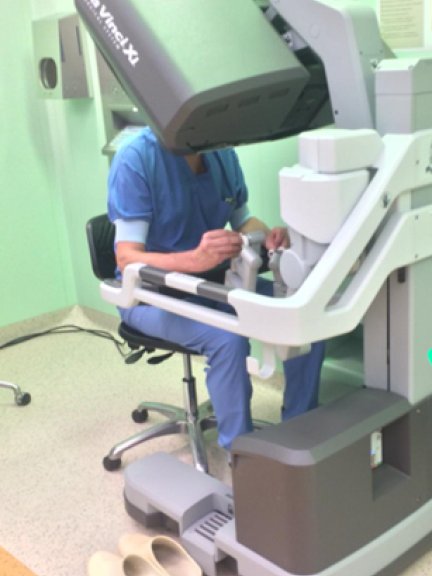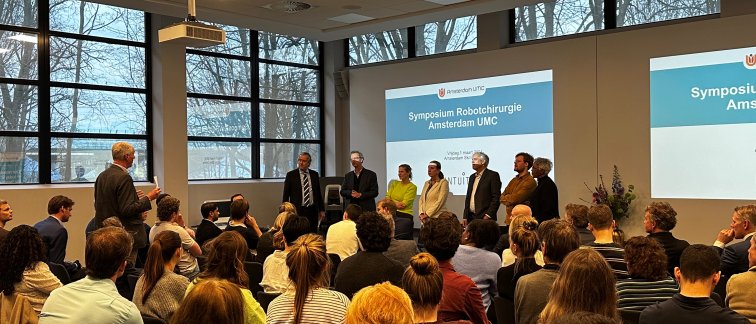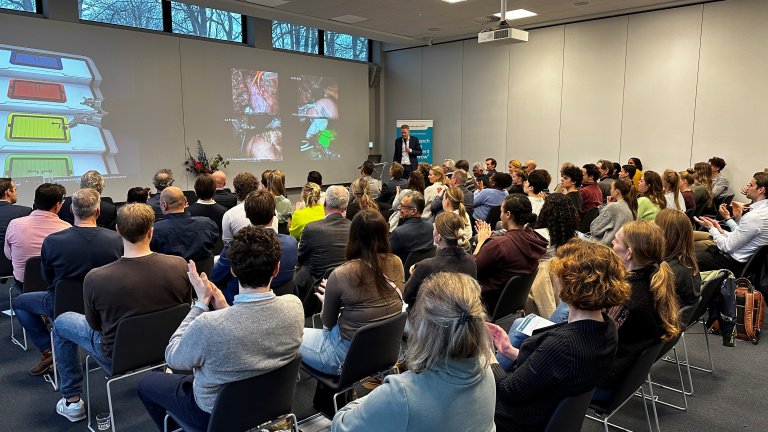The event was opened by professor Geert Kazemier, director of the Cancer Center Amsterdam Foundation. He explained the important and ever-increasing role for robotic systems in the minimally invasive treatment of cancers striving for better patient recovery with less pain. For this reason, Cancer Center Amsterdam traditionally has been a strong supporter of the robotic program in Amsterdam UMC.
The committee strongly encourages surgeons to confirm the added clinical value and cost-effectiveness of robotic surgery in clinical research as indications are not set in stone. Mirza Idu, vascular and transplant surgeon, showed a video about the robotic kidney transplantation procedure and mentioned the benefits of robotic kidney transplantation compared with the open technique. Rutger-Jan Swijnenburg, hepato-pancreato-biliary surgeon, demonstrated nationwide data for robotic liver surgery showing the cost-effectiveness as compared to traditional laparoscopic surgery mainly due to a reduction of intra-operative conversions to open surgery. Surgical resident Jony van Hilst showed the reduction of complications and faster recovery with robotic as compared to open pancreatic surgery.
The perspectives of surgical scrub nurses were discussed by Esther Snoek. It is her vision and that of her colleagues that scrub nurses will increasingly evolve to senior surgical assistants during complex robotic procedures. This will allow scrub nurses to develop their field and will support patients and surgeons in an era of reduced presence of surgical residents. Hans van Goudoever, chair of the board of directors shared his approval for such developments and the commitment of the entire surgical community in Amsterdam UMC for robotic surgery.

Robot Surgery Console
Finally, a lively panel discussion moderated by professor Bonjer, chair of the Department of Surgery and director of Amsterdam Skills Centre, included a broad variety of colleagues including Hans van Goudoever, chair of the board of directors, Niek Sperna Weiland from the OR Green Team, Folkert Asselbergs on artificial intelligence, and Marlies Schijven on the ‘Black Box’ system in robotics. Eva Soeter, senior surgical nurse, mentioned how the ward care for patients has changed in recent years with even shorter hospital stays due to minimally invasive robotic surgery. Shirley Sussenbach, senior scrub nurse, confirmed the growing role of scrub nurses during robotic surgery. The following open discussion together with the audience considered these and other aspects on the future of robotic surgery in Amsterdam UMC: the added value for patients, the environmental impact, the experience
of surgical ward nurses and scrub nurses, healthcare costs, the (potential) use of artificial intelligence, and digital healthcare and training of the future generation of surgeons, scrub nurses and residents.
This article was created for Cancer Center Amsterdam by Marc Besselink, Julia
Menso and Rawin Amiri.


